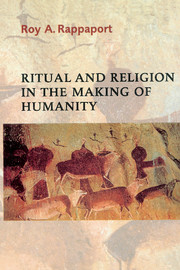Book contents
- Frontmatter
- Contents
- Foreword
- Preface
- 1 Introduction
- 2 The ritual form
- 3 Self-referential messages
- 4 Enactments of meaning
- 5 Word and act, form and substance
- 6 Time and liturgical order
- 7 Intervals, eternity, and communitas
- 8 Simultaneity and hierarchy
- 9 The idea of the sacred
- 10 Sanctification
- 11 Truth and order
- 12 The numinous, the Holy, and the divine
- 13 Religion in adaptation
- 14 The breaking of the Holy and its salvation
- Notes
- References
- Index
- Cambridge Studies in Social and Cultural Anthropology
Foreword
Published online by Cambridge University Press: 05 June 2012
- Frontmatter
- Contents
- Foreword
- Preface
- 1 Introduction
- 2 The ritual form
- 3 Self-referential messages
- 4 Enactments of meaning
- 5 Word and act, form and substance
- 6 Time and liturgical order
- 7 Intervals, eternity, and communitas
- 8 Simultaneity and hierarchy
- 9 The idea of the sacred
- 10 Sanctification
- 11 Truth and order
- 12 The numinous, the Holy, and the divine
- 13 Religion in adaptation
- 14 The breaking of the Holy and its salvation
- Notes
- References
- Index
- Cambridge Studies in Social and Cultural Anthropology
Summary
Emile Durkheim published Les Formes élémentaires de la vie réligieuse in 1912, on the eve of the First World War. The war consolidated a process which had been building up for at least three decades and which we can now see laid the foundations for the kind of society familiar to our twentieth-century world. This society was organized by and for centralized states, staffed by a professional class of scientific experts. Durkheim himself, as the principal founder of the discipline of sociology, had taken the lead in establishing the new sciences of society which would underpin the activities of this class. Yet in The Elementary Forms he posed an immense problem for the future of humanity. Science appeared to have driven religion from the field as a serious intellectual ground for the organization of society; but it could not perform the function of religion. This left a huge hole in the spiritual existence of modern people which Durkheim knew must be filled, but he himself was powerless to imagine how.
Roy Rappaport's book, the result of more than three decades' investigation into the relationship between religion, society and ecology, is, in my view, the first systematic attempt to address the question which Durkheim left unanswered. As such, it deserves to be seen as a milestone in the anthropology of religion comparable in scope to his great predecessor's work.
- Type
- Chapter
- Information
- Ritual and Religion in the Making of Humanity , pp. xiv - xxPublisher: Cambridge University PressPrint publication year: 1999
- 5
- Cited by

